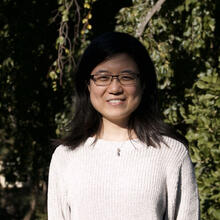Dark energy and cosmic inflation are two enigmas in fundamental physics. We have a wide range of theoretical models for these two enigmas and we need precise observational constraints to discriminate among these models. For dark energy, the most prominent observational probe is the baryon acoustic oscillation (BAO) technique that maps the expansion history; for inflation, primordial non-Gaussianities (PNG) that are predicted by certain inflation models can be measured in the late-time Universe. This decade is witnessing a vast influx of high-precision cosmological observational data from various experiments, and the type that is most relevant to probe these two physics is large galaxy redshift surveys, which provide 3D observations of the late-time Universe. We need to improve our analysis techniques to fully realize the potential of those surveys to probe dark energy and inflation. One technique that can benefit both is reconstructing the initial conditions, by removing gravitational nonlinearity from the observed late-time density field. This thesis analyzes a newly proposed reconstruction algorithm in comparison of the standard reconstruction algorithm, in particular in the performance of BAO parameter fitting. Further, we propose a hybrid algorithm to enhance the performance of traditional algorithms using machine learning techniques. After these, we explore the application of reconstruction to constraining PNG and we propose an alternative approach to the usual method to constrain PNG. While the application of reconstruction for BAO is well established, it is not mature for PNG. In the final chapter, we closely analyze two reconstruction algorithms for “cutsky” in real surveys as part of the Dark Energy Spectroscopic Instrument (DESI) Year 1 analysis. This paves way for application of new reconstruction algorithms to real data. To conclude, we discuss further improvements to reconstruction and developments for application of reconstruction for PNG. We also discuss the application of the hybrid reconstruction algorithm to DESI.
Thesis committee: Nikhil Padamanabhan (advisor), Frank van den Bosch, Daisuke Nagai, Daniel Eisenstein
Physics Dissertation Defense: Xinyi Chen, Yale University, “Reconstruction of the initial conditions: improvements and applications to constraining dark energy and primordial non-Gaussianity”
Event time:
Thursday, July 25, 2024 - 1:30pm to 2:30pm
Location:
Kline Biology Tower (), Kline 14
219 Prospect Street
New Haven, CT
06511
Event description:
Contact:
(see "Description" above)
